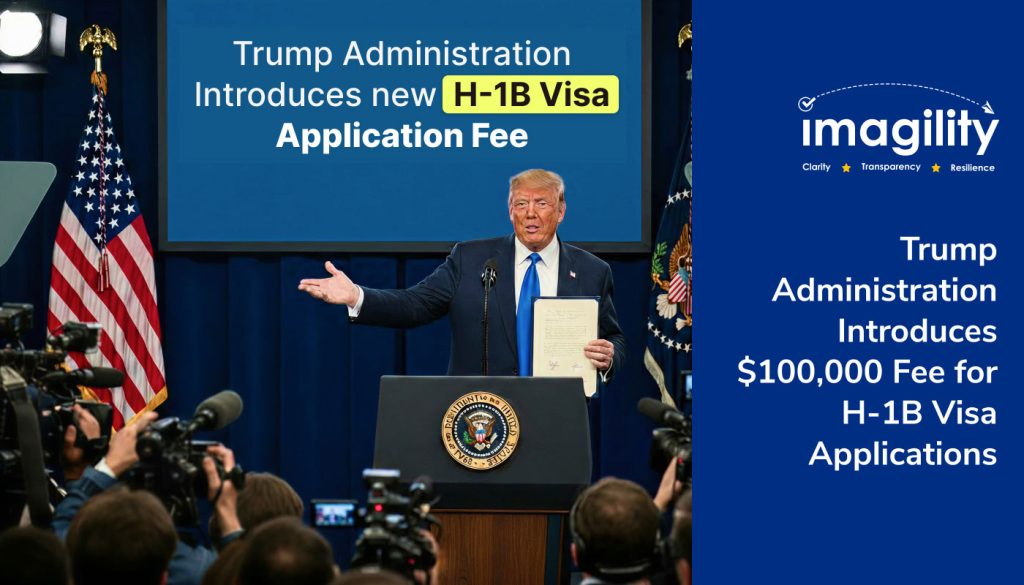The H-1B visa program, which U.S. companies rely on to hire skilled workers from abroad, has undergone a major change. On September 21, 2025, President Donald Trump signed a proclamation introducing a $100,000 fee for every new H-1B application.
At the same time, the Department of Labor will raise the minimum wage requirements for H-1B workers. The government says these measures aim to protect American jobs, but the impact for employers and international professionals will be significant.
A Steep New Fee Transforming Sponsorship Costs
Until now, applying for an H-1B visa already came with several costs, like $215 for the lottery registration and $780 for the petition filing. The new $100,000 fee is on top of these existing charges, making sponsorship dramatically more expensive.
For big corporations, this will raise costs but may still be manageable. For smaller companies, however, the cost could be overwhelming. A business sponsoring 10 employees a year would now need to spend an extra $1 million, just in application fees.
Higher Wage Standards That Raise the Bar for Employers
The proclamation also requires the Department of Labor to raise the minimum wage levels for H-1B workers. That means employers will have to pay higher salaries to meet the new requirements.
For HR teams, this means not just budgeting for higher visa costs, but also adjusting payroll and compliance practices to avoid penalties.
How Employers Will Feel the Impact
These changes will affect businesses in several ways:
- Costs will rise sharply for companies that sponsor international workers.
- Smaller companies may stop hiring H-1B workers, leaving the program dominated by large corporations.
- Labor shortages could increase, especially in technology, engineering, and healthcare, where U.S. talent alone may not be enough.
- Innovation may slow down, as fewer international professionals are able to join U.S. teams.
- Companies may change strategy, turning to automation, outsourcing, or training domestic workers instead of hiring abroad.
Impact on International Workers
For skilled professionals abroad, the U.S. has long been seen as the top destination for career growth. With this new fee, however, many opportunities may disappear.
- Employers may only reserve H-1B sponsorship for senior or critical roles.
- Younger workers, students, and recent graduates may find it much harder to get sponsored.
- Some international workers may instead choose countries like Canada or the UK, where visa policies are less restrictive.
The Shifting Ground of U.S. Competitiveness
The government argues these changes will protect U.S. workers and raise wage standards. But many business leaders warn that such a high fee could turn the H-1B into a “luxury visa”, shutting out smaller companies and reducing the U.S.’s ability to attract top talent.
The risk is clear if international professionals stop seeing the U.S. as an option, America’s long-held reputation as the world leader in technology and innovation could weaken.
What Employers Should Do Next
HR and business leaders need to act quickly to adapt to the new H-1B changes:
- Review immigration budgets to see how the new fee impacts hiring plans.
- Reconsider workforce strategies, including whether to focus more on domestic hiring, automation, or global offices.
- Stay informed about policy updates, since further changes to visa rules may follow.
Final Thoughts: A Turning Point for H-1B and Global Hiring
The new H-1B rules represent a turning point for both U.S. companies and international workers. While the government sees this as a way to protect American jobs, the reality for employers is rising costs, tighter compliance, and possible talent shortages. For workers abroad, the path to a U.S. career has become narrower and more expensive.
These changes could also affect the U.S. economy and innovation. Industries like tech, engineering, and healthcare may face worker shortages or slower growth. With the U.S. becoming more expensive and selective, top international talent may go to other countries, which could weaken America’s role as a global leader in skilled work and innovation.










